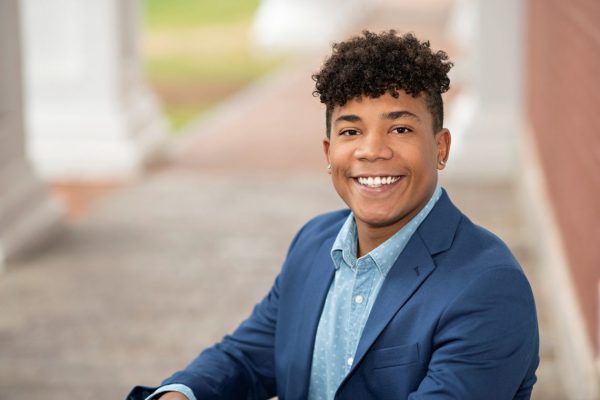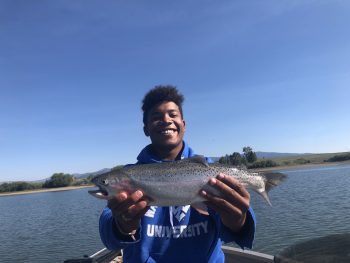Meet a W&L Scholar: AJ Mabaka ’22 AJ Mabaka '22 plans to attend a graduate program in marine science and conservation policy.
Editor’s note: This series will present a conversation with a current W&L scholarship recipient or summer research scholar. W&L’s generous donors have made these funds possible to enhance the university’s learning community.
“I extend my heartfelt thank you to all of those who helped facilitate, in various ways, what was truly a phenomenal and transformative internship experience for me.”
~ AJ Mabaka ’22
Hometown: White Plains, New York
Summer Program: A. Paul Knight Intern in Conservation at Henry’s Fork Foundation in Ashton, Idaho
Major: Environmental science with a focus on water resources
Q: What first attracted you to Washington and Lee?
This is one of my favorite conversations to have with other students at W&L. Usually it is sparked by a friend or family member who knows of the school or who attended, but I got a flyer in the mail. My mom said it was a good school, and I knew I wanted to stay on the East Coast. I was planning to visit five universities, and W&L was the third one I visited. After that, I didn’t want to visit any other schools. I applied early-decision and was ecstatic when I was accepted. I made the right choice. And it made me re-think all of those things I get in the mail!
Q: Describe your internship and what you gained from the experience.
Due to the pandemic, I was a remote Henry’s Fork Foundation intern in 2020, and I loved HFF’s mission and my experiences so much that I decided to participate in the internship again! I really wanted to be physically present in such a beautiful area of the country. During my first summer as an intern, I did more bio-energetic modeling using water quality parameters to predict the ideal amount of habitat that needs to be available for sport fish, and I was able to present useful data that called for increased stream management in over-fished parts of the watershed.
For my most recent internship experience in summer 2021, I was able to work with the same mentor in person and gained a serious passion for conducting field research, which has further cemented my desire to pursue a career in marine wildlife and conservation. I learned an immense amount about the ins and outs of managing, protecting and researching wild trout fisheries, including collecting water quality data every Friday on the Island Park Reservoir with my mentor, writing code for data management in R coding software, and fly fishing whenever I was not working. My experience with the Henry’s Fork Foundation was made possible through A. Paul Knight and his memory, Mrs. Gail Knight, many generous donors, my W&L professors who encouraged me to apply for this opportunity, and to everyone at the foundation for their dedication to research that has proven imperative to the successful management of the fisheries and the Henry’s Fork watershed. I extend my heartfelt thank you to all of those who helped facilitate, in various ways, what was truly a phenomenal and transformative internship experience for me.
Q: What were some of the highlights of your experience?
Catching my first fish on the fly rod, gaining proficiency in the R coding language and seeing moose were definitely some highlights of my internship experience over the summer. I enjoyed being able to go hiking in some unbelievably scenic places like Yellowstone National Park and Grand Teton National Park. The hike to the Grand Prismatic Springs in Yellowstone was undoubtedly my favorite hike that I have ever done!
Also, I definitely felt the weight of the W&L network while in Ashton, Idaho. I knew there were other W&L interns in my class year working with Henry’s Fork in different areas, but they were all at least an hour away, so I did not expect to see anyone I knew or have any connections. But I ran into Chris Anderson, who graduated two years ago, which was remarkable! I also met two fly-fishing shop owners who turned out to be W&L grads, Jon Stiehl ’93 and Rich Paini ’93. They said they participated in the internship as well, and liked Idaho so much that they stayed. I was on the W&L wrestling team up to my junior year, and I met the former wrestling coach Gary Franke. I was able to go fishing, hiking and have great conversations with these people simply because of the trident I proudly wear. That kindness and desire to reciprocate it show how much members of the W&L community care for one another, no matter the differences between us, and it is what I love most about our school.
Q: What are you up to now?
I just completed a term as a visiting student at Duke University’s Marine Lab. I took classes in marine ecology, marine mammals, oceans in human and environmental health and off-shore renewable energy. I also undertook an independent research project with another student focused on sea urchins and a work study with my marine ecology professor to assist with an oyster reef restoration project.
Q: Favorite W&L professors?
Professor Robert Humston, who is the John Kyle Spencer Director for Environmental Studies, and Geology Professor Lisa Greer. When I first got to W&L, I thought I wanted to be pre-med, but I took a genetics class and it wasn’t for me. I then took an environmental studies class with Professor Humston, and I loved it. He connected me with Professor Greer because of my interests in marine life, and I participated in a research project she led in Belize studying the coral reef decline.
Q What are your plans after graduation?
I am applying to graduate programs in marine science and conservation policy. I am very interested in coral reef conservation and research on how to mitigate coral reef decline, thanks to my experience with Professor Greer. My recent class at Duke has sparked my interest in off-shore wind energy, its rapid pace of development, and how that affects fisheries and fisheries management.
The A. Paul Knight Memorial Program in Conservation was established in 1987 in memory of A. Paul Knight, a Washington and Lee student who was killed in Yellowstone National Park in June 1985. The program provides financial support to students who undertake internships with nonprofit environmental and outdoor recreation organizations.



You must be logged in to post a comment.